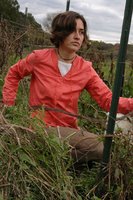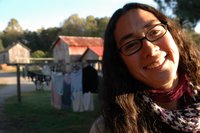Egalitarian Communities
Twin Oaks, as you may have already read in Erin's posting below, is an intentional community - a group with its own clear borders and membership that shares a common vision. What makes Twin Oaks particularly interesting is that it is part of the Federation of Egalitarian Communities (www.thefec.org). These communities vary in size and style but all share the same basic values of communal ownership of land and resources, income-sharing, participatory government and a commitment to peace, nonviolence and the environment.
 Operating from those principles, what seems to work incredibly well here is the fact that all your basic needs are met with relatively minimal effort. Sure, you have to put in 43 hours of work/week which is more than your average full-time job but the schedule is flexible, the work varied and the bosses non-existent. You aren't constantly concerned about cooking meals, buying food, paying rent/mortgage, and doing errands.
Operating from those principles, what seems to work incredibly well here is the fact that all your basic needs are met with relatively minimal effort. Sure, you have to put in 43 hours of work/week which is more than your average full-time job but the schedule is flexible, the work varied and the bosses non-existent. You aren't constantly concerned about cooking meals, buying food, paying rent/mortgage, and doing errands. How much of our energy in mainstream culture is spent on these daily or weekly tasks? Instead, one person will do the weekly run to the nearest town for supplies, food etc. You don't have to worry about car insurance as there are 18 communal cars should you need one and a mechanic in the community should the car have a problem. In terms of food, Twin Oaks has cows that provide milk, yogurt, cheese and meat, a garden that yields most of the vegetables and a tofu business that not only provides the community with income but is another food source.
How much of our energy in mainstream culture is spent on these daily or weekly tasks? Instead, one person will do the weekly run to the nearest town for supplies, food etc. You don't have to worry about car insurance as there are 18 communal cars should you need one and a mechanic in the community should the car have a problem. In terms of food, Twin Oaks has cows that provide milk, yogurt, cheese and meat, a garden that yields most of the vegetables and a tofu business that not only provides the community with income but is another food source. Although Erin and I have been working in the community, we still find it hard to walk into the community kitchen and help ourselves to food in the fridge without actually 'paying' for it. It's hard to get away from a money-based mentality. Yet, barely any money is exchanged within the community because there is simply no need for it. You can go weeks here without needing a wallet. In the book, Nickled and Dimed, by Barbara Ehrenreich, the author embarks on a quest to discover whether it is possible for a single woman to survive on minimum wage in the United States. She goes 'undercover' working as a waitress, a maid, and a Wal-Mart employee giving herself a month in each job to try and make ends meet. She needs to pay for rent, gas, food and other incidental expenses. It should come as no surprise that her experiment basically fails. Even holding down two jobs, she is unable to 'get ahead' and have a decent standard of living. Keep in mind that she is a single, English-speaking white woman with no kids in this society and it is difficult for her to get by. It makes the task for many low-income families and individuals look fairly daunting.
Although Erin and I have been working in the community, we still find it hard to walk into the community kitchen and help ourselves to food in the fridge without actually 'paying' for it. It's hard to get away from a money-based mentality. Yet, barely any money is exchanged within the community because there is simply no need for it. You can go weeks here without needing a wallet. In the book, Nickled and Dimed, by Barbara Ehrenreich, the author embarks on a quest to discover whether it is possible for a single woman to survive on minimum wage in the United States. She goes 'undercover' working as a waitress, a maid, and a Wal-Mart employee giving herself a month in each job to try and make ends meet. She needs to pay for rent, gas, food and other incidental expenses. It should come as no surprise that her experiment basically fails. Even holding down two jobs, she is unable to 'get ahead' and have a decent standard of living. Keep in mind that she is a single, English-speaking white woman with no kids in this society and it is difficult for her to get by. It makes the task for many low-income families and individuals look fairly daunting.Yet, what would happen if instead you lived in community, pooled your resources and income and split your expenses. We've always known that it's a cheaper way to go. We do it all the time by living with housemates, splitting food expenses etc. Twin Oaks is just a massive experiment in this same concept. The beauty of it though is that rather than working for a giant corporation like Wal-Mart that essentially destroys local economy and gives little back to the employee, at Twin Oaks, you are working for yourself and the collective good of the community where you live. When the community divides up their annual income between all 100 members, it averages to about $6,000/year.
 How many of us can live on $6,000/year and have food, shelter, clothing, access to cars, internet and computers? It seems to be an experiment that is working. It isn't Utopia yet as many like to say in this community and the system certainly comes with a whole set of issues yet I like the idea of reducing everything to a more local, tangible, egalitarian economic system.
How many of us can live on $6,000/year and have food, shelter, clothing, access to cars, internet and computers? It seems to be an experiment that is working. It isn't Utopia yet as many like to say in this community and the system certainly comes with a whole set of issues yet I like the idea of reducing everything to a more local, tangible, egalitarian economic system.In an article I was reading the other day Joanna Macy is quoted as claiming there are 3 different activities that are required for the 'Great Turning' (i.e. the turning away from industrial growth and the military industrial complex to a sustainable future). Those three activities are:
1) Resistance
2) Creating models of the future in the present (e.g. permaculture, intentional communities)
3) Working directly on changing consciousness
Which role, if any, are we willing to take on?
 "We don't need hope or hopelessness, we don't need to know what's going to happen, we just need to know that in any case, we should do things that are true and right and beautiful."
"We don't need hope or hopelessness, we don't need to know what's going to happen, we just need to know that in any case, we should do things that are true and right and beautiful."- John Seed
More musings soon....
Kareen

0 Comments:
Post a Comment
<< Home